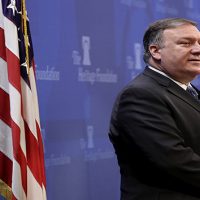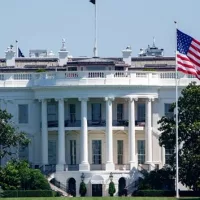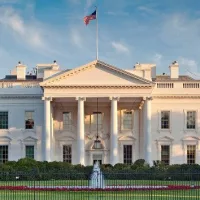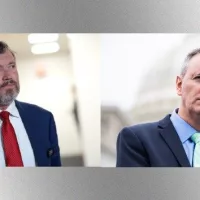
 Win McNamee/Getty Images(WASHINGTON) — Secretary of State Mike Pompeo on Monday, in his first major foreign policy address, outlined 12 demands the U.S. has for Iran moving forward after President Donald Trump pulled the U.S out of the Iran nuclear deal.
Win McNamee/Getty Images(WASHINGTON) — Secretary of State Mike Pompeo on Monday, in his first major foreign policy address, outlined 12 demands the U.S. has for Iran moving forward after President Donald Trump pulled the U.S out of the Iran nuclear deal.
The demands ranged from ceasing all nuclear activity to ending support for terrorist groups like the Houthi rebels in Yemen, to pulling Iranian forces out of Yemen and Syria.
“Relief from our efforts will come only when we see tangible, demonstrated, and sustained shifts in Tehran’s policies,” Pompeo said during the speech delivered at the conservative Heritage Foundation in Washington. Pompeo noted the list of demands may seem long, but placed the blame for the long list on Iran’s malign activity including holding U.S. citizens hostage.
However, Pompeo did not explicitly outline the pressure campaign the U.S. intends to use to bring Iran to the negotiating table, nor did he outline a timeline for achieving his stated goals.
The U.S. has already re-imposed sanctions lifted under the Iran deal, or the Joint Comprehensive Plan of Action (JCPOA), and imposed new sanctions on Iran’s Central Bank and other entities funneling money to the Iranian Revolutionary Guard Corps Quds Force as well as Hezbollah.
Pompeo said the new sanctions are “just the beginning” of the pressure campaign and the sting “will only grow more painful” if the regime does not change course.
“These will be the strongest sanctions in history by the time we are done,” Pompeo said.
Affecting that much change in Iran’s behavior may be an uphill battle for the Trump administration, given the lack of support for this new deal from European allies.
“From my conversations with European friends I know that they broadly share these same views of what the Iranian regime must do to gain acceptance in the international community,” Pompeo said, calling on allies to join the U.S. in pressuring Iran to change.
But Pompeo later said he understands the European allies may try to keep the JCPOA in place.
“That is certainly their decision to make. They know where we stand,” Pompeo said.
In a question and answer session after the speech, Pompeo said in his first days as secretary of state, he spent time “Trying to see if there was a way to fix the deal.” Pompeo flew to Brussels for a NATO Foreign Ministers meeting just hours after being sworn in.
“We couldn’t get it done. We couldn’t reach an agreement there,” Pompeo said of his efforts. He didn’t specify how he would convince the European allies to go along with the U.S. plan. “I’m convinced that over a period of time, there will be a broad recognition that the strategy president trump has laid out is the right one, that will put Iran in a place where it will one day rejoin civilization in the way we all hope that it will.”
The European Union is currently moving ahead with launching a “blocking statute” against U.S. sanctions on Iran to soften the blow. The law would prevent European companies from complying with U.S. sanctions. The European Commission also suggested EU governments make direct money transfers to Iran’s central bank to avoid U.S. penalties and bypass the U.S. financial system.
Those moves to save the deal indicate the Europeans would be reluctant to join a coalition with the U.S. to negotiate a new deal.
And despite those moves, Iran says Europe’s support for the JCPOA is not enough.
“With the withdrawal of America… the European political support for the accord is not sufficient,” Iran’s Foreign Minister Javad Zarif told the EU Commissioner for energy and climate during a meeting in Tehran Sunday.
National Security Advisor John Bolton has said “it’s possible” that the U.S. would also impose sanctions on European corporations who continue to do business with Iran and attempt to uphold the JCPOA.
Pompeo reiterated those threats today. “You should know that we will hold those doing prohibited business in Iran to account. Over the coming weeks, we will send teams of specialists to countries around the world to further explain the Administration’s policy, discuss the implications of sanctions re-imposition, and hear your concerns.”
As tensions with the Europeans increase, Pompeo called for U.S. allies around the world to support the administration’s new plan.
“I want the Australians, the Bahrainians, the Egyptians, the Indians, the Japanese, the Jordanians, the Kuwaitis, the Omanis, the Qataris, the Saudi Arabians, the South Koreans, the UAE, and many, many others worldwide to join in this effort against the Islamic Republic of Iran,” Pompeo said.
Pompeo also called for Congress’s support, saying a treaty ratified by Congress, rather than executive action, is the preferred course of action. He expressed confident a plan proposed by President Trump would “surely garner… widespread support from our elected leaders and the American people.”
Pompeo referenced diplomacy with North Korea as evidence of Trump’s “sincerity and vision.”
“Our willingness to meet Kim Jong Un underscores the Trump Administration’s commitment to diplomacy to help solve the greatest challenges, even with our adversaries,” Pompeo said. But the remarks come as President Trump’s summit with North Korean leader Kim Jong Un, set for June 12th in Singapore, is in doubt, after a North Korean nuclear negotiator threatened the country might pull out of the meeting if the U.S. insists on “unilateral nuclear abandonment,” and expressed “feelings of repugnance” towards National Security Advisor John Bolton.
Copyright © 2018, ABC Radio. All rights reserved.














